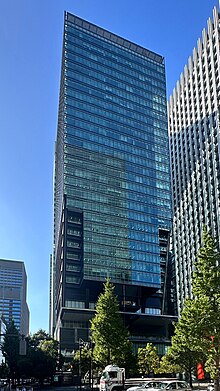Sankei Shimbun
[27] Together with its English-language paper Japan Forward, the Sankei Shimbun has been described as having a conservative, nationalist, right-wing to far-right[20][21][22] political stance.[32] In August 2014, South Korea filed suit against the Sankei for insults against president Park Geun-hye, published in one of the newspaper's articles, and demanded Tatsuya Kato, head of the Seoul Bureau, present himself for questioning.[42][43] On February 11, 2015, regular columnist Ayako Sono wrote an opinion piece opining that though she considered it necessary for Japan to accept more immigrants to bolster its decreasing workforce, it would also be necessary for Japan to take steps to ensure the separation of immigrants in regards to living conditions, citing South African apartheid as an example of how to achieve this goal.The book mailings were part of a project by right-wing groups such as the Nippon Kaigi to improve international perceptions of Japan.[32] A covering letter from politician Inoguchi Kuniko read in part: "In East Asia, the regional history of the 20th century has been incorrectly distorted (sic) by some individuals due to their current domestic political ambitions, I believe it is important for you, as a highly esteemed member of the academic and policy circles (sic), to look into the books which I am enclosing with this letter.
Daily newspaperFuji Media HoldingsConservatismNationalismRight-wingfar-rightCirculationConservatism in JapanCapitalistFiscalCorporateNationalistMinzokuShōwa StatismReligiousState ShintoAsian valuesAuthorityBushidoDisciplineElitismMeritocracyFamilialismFilial pietyHeroismHierarchyImperialismJapanese cultureJapanizationKokutaiLaw and orderLoyaltyMilitarismNativismGaijinPatriotismShintoSocial orderSovereigntyTraditionYamato-damashii1955 SystemAbenomicsAnti-Comintern PactCIA activitiesEmperor systemTenkōPeace Preservation LawRed PurgeRed ScareSatsuma RebellionU.S.-Japan Security TreatyFukudaHasudaHirataHyakutaKanokogiKobayashiMasakiMayuzumiMinobeMizushimaMishimaMiyakeNishibeŌkawaOshikawaSakuraiSugiyamaSuzukiTadayukiTsunetomoWatsujiHagakureThe Book of TeaShinmin no MichiAn Investigation of Global PolicySun and SteelThe Japan That Can Say NoThe Dignity of the NationHashimotoHatoyamaHiranumaIshibaIshiharaKawamuraKiichirōKoizumiNakagawaNakasoneSugitaTakaichiTojo (Hideki)Tojo (Yuko)Conservative Party of JapanDemocratic Party for the PeopleGreater Japan Patriotic PartyHappiness Realization PartyJapan First PartyJapan Innovation PartyLiberal Democratic PartyTokyoites First PartyRestoration Political PartyParty of Do it YourselfConstitutional Government AssociationImperial Rule Assistance AssociationJapan Renewal PartyJapan Restoration PartyNew Conservative PartyParty for Japanese KokoroParty of HopePeople's New PartySunrise PartyYour PartyGanbare NipponJapanese Society for History Textbook ReformNippon KaigiZaitokukaiBlack Dragon SocietyGenyōshaKenkokukaiKokuryūkaiSakurakaiTatenokaiBungei ShunjūShokun!